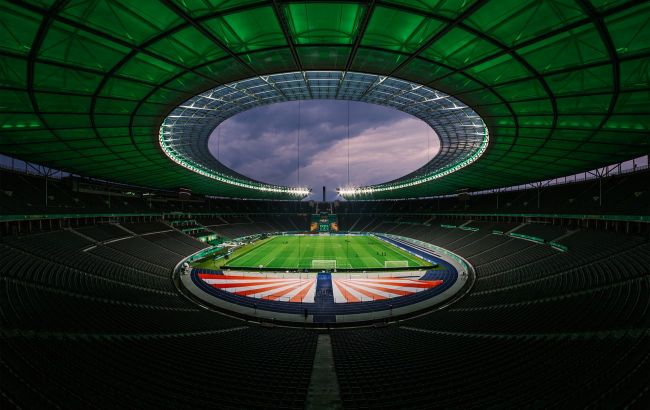Euro 2024: Cities and stadiums of football championship
 Photo: Berlin's Olympiastadion will host the Euro 2024 final (facebook.com/olympiastadionberlinlive)
Photo: Berlin's Olympiastadion will host the Euro 2024 final (facebook.com/olympiastadionberlinlive)
Ten German cities, led by Berlin, will host 51 matches of the European Championship final tournament in four weeks.
Read a brief overview of the football arenas of the Euro 2024 host cities in RBC-Ukraine's material.
The European Championship will begin on June 14 with a match between Germany and Scotland. The tournament will last for a month - until July 14.
The organizers of the competition have selected 10 German cities to host Euro 2024. The European Championship matches will be hosted by 10 stadiums. Officials have temporarily renamed a number of arenas, as the Union of European Football Associations (UEFA) has banned the use of sponsor names during the European Championship.
The opening match of Euro 2024 will be hosted by the Fussball Arena Munich in the capital of Bavaria. The final will take place at the Olympiastadion in Berlin. Meanwhile, the Ukrainian national team will play group stage matches in Munich, Düsseldorf and Stuttgart.
Olympiastadion (Berlin)
The iconic arena was built before the 1936 Olympic Games. Since then, the stadium has been modernized twice before two World Cups (1974, 2006). In addition to the 2006 FIFA World Cup final, the Olimpiastadion was the venue for the Champions League final and other competitions. During the year, Hertha (Berlin) operates the stadium, while the capital's government remains the owner.
BVB Stadion Dortmund (Dortmund)
Experienced fans know Borussia Dortmund's home arena as the Westfalenstadion. And no sponsorship deals can change that. The stadium was built in the early 70s and has been reconstructed several times since then. The arena hosted both the 1974 and 2006 World Cups. This year, the club stadium will host 6 matches, including the semifinals.
Photo: Olympiastadion and BVB Stadion Dortmund (en.wikipedia.org)
Düsseldorf Arena (Düsseldorf)
The increase in the number of Euro 2024 participants was appropriate for Dusseldorf. The capital of North Rhine-Westphalia missed out on the 2006 World Cup, although the current stadium had already been built on the site of the outdated Rheinstadion. The 46-thousand-seat arena is owned by the magistrate, and the local Fortuna from the Second Bundesliga remains the stadium's main operator. The Ukrainian national team will play against Slovakia here.
Volksparkstadion (Hamburg)
The arena in the port city is well known to Ukrainian fans. It was here that Shakhtar Donetsk played their home matches in the European Cups last season. The locals saw matches of two World Cups and Euro 1988 at this stadium. So far, the most expected event of the upcoming tournament here seems to be the match between Poland and the Netherlands. However, the quarterfinal pair will be able to overshadow them.
Aufschalke Arena (Gelsenkirchen)
Built in the late 90s, Schalke's home stadium will host a major tournament for the second time since the 2006 World Cup. The key match of Group B of Euro 2024 between Spain and Italy will probably be played here. Ukraine may also potentially visit the industrial city. If Ukraine becomes third in the group and reaches the playoffs, the Round of 16 match will probably be played in Gelsenkirchen.
Köln Stadium (Cologne)
Ukrainian footballers have already been here. The Soviet national team, led by Valerii Lobanovskyi and featuring over a dozen players from Kyiv's Dynamo and Dnipro, defeated the Netherlands at the start of Euro 1988. Meanwhile, the Ukrainian national team triumphed over Switzerland in the legendary penalty shootout named after Oleksandr Shovkovskyi at the RheinEnergieStadion during the 2006 World Cup. This year, the stadium's highlight will be the Round of 16 match.
Photo: Düsseldorf Arena, Volksparkstadion, Arena AufSchalke, and Cologne Stadium (en.wikipedia.org)
Leipzig Stadium (Leipzig)
Another iconic arena for Ukrainian football. It was here that Ukraine made its World Cup debut in 2006, receiving a cold shower from the Spanish national team (0:4). At Euro 2024, the main attraction of the RB Leipzig stadium will be the confrontation between the Netherlands and France in the group stage. And it's worth noting that this stadium is the only one from Eastern Germany in the tournament.
Allianz Arena Munich (Munich)
The home stadium of Munich's Bayern has become the second most important in Germany. Here will take place the opening match and one of the semifinals. It is significant for the Ukrainian national team. Here Serhii Rebrov's wards will start their European Championship campaign against Romania on June 17. If the Ukrainian team wins Group E of the tournament, they will return to Munich for the Round of 16 match.
Frankfurt Arena (Frankfurt)
Another stadium with a rich history. Matches of the 1974 World Cup, Euro 1988, the 2006 World Cup were played here, and hundreds of pop-idol concerts were held. The nearly 50,000-seater arena will host five matches this year. Among them, one of the group stage matches will be played by the German national team against Switzerland. And it will be a home stadium for the Slovak national team, which will play here at least twice.
Stuttgart Arena (Stuttgart)
The stadium in the heart of the German automotive industry has seen a lot. Including the victory of the Soviet national team at the memorable Euro 1988. Valerii Lobanovskyi's team defeated Italy here with goals from Hennadii Lytovchenko and Oleh Protasov. And at the 2006 World Cup, the German national team won bronze medals at the local arena in a match against Portugal. At Euro 2024, the Ukrainian national team will conclude the group stage in Stuttgart with a match against Belgium.
Photo: Leipzig Stadion, Fussball Arena Munich, Frankfurt Arena and Stuttgart Arena (en.wikipedia.org)

